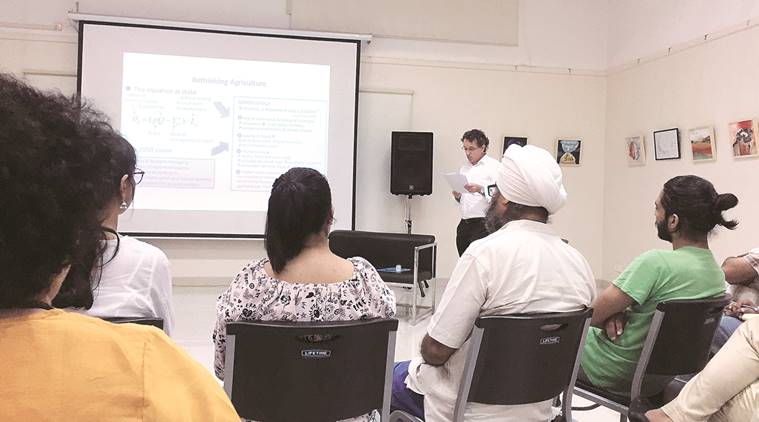 The third anniversary of Chandigarh Organic Farmers’ Market was celebrated at Alliance Francaise in Chandigarh Saturday. (Express photo)
The third anniversary of Chandigarh Organic Farmers’ Market was celebrated at Alliance Francaise in Chandigarh Saturday. (Express photo)
Written by Rasseerat Kohli
The world has 60 years of top soil left with the current level of cultivation, either stop or starve, said author Rishi Miranshah, while speaking on the topic, The Story of Food, Saturday.
“The premise of the possibility of a better future is solely in the hands of humans who, by all means, have triggered the downside of a beautiful landscape, harbouring interdependent species…,” he said during the third-anniversary celebrations of Chandigarh Organic Farmers’ Market at Alliance Francaise here Saturday.
Miranshah, through a presentation, narrated the importance of biological sustainability.
He ended the presentation with the belief that following the path of self-interrogation, we can choose to begin the end of a story we started authoring 10,000 years ago.
Earlier, the function began with a presentation by Bruno Dorin, an agricultural economist from France, who touched upon the current state of agriculture in western economies and allied employment percentage.
Highlighting a reform of the conventional agricultural means and methods, Dorin capitalised on Agroecology – the study of the role of agriculture in the world.
He emphasized on the need for higher bio-diversity and biological synergies, comprising a paradigm shift in inputs, prices and values.
As open-ended questions on profitability of cooperative farming unfolded, Professor Upendra Nath Roy proposed an idea of a collaborative research project with Dorin and his team on eco-village development in Punjab and neighbouring Himachal Pradesh.
As recommended by Dorin, Punjab’s farmers need to demand the reversal of subsidy on fertilisers, electricity and water and instead ask for a regular supply of power and subsidy for diversification into crop varieties.
The second part of the event garnered attention on how the catchphrase ‘We do not belong to the earth, the earth belongs to us’ has led the destructive forces of deforestation, soil erosion, air toxicity, water crisis, world hunger and starvation to create a version of ‘humanised nature’.